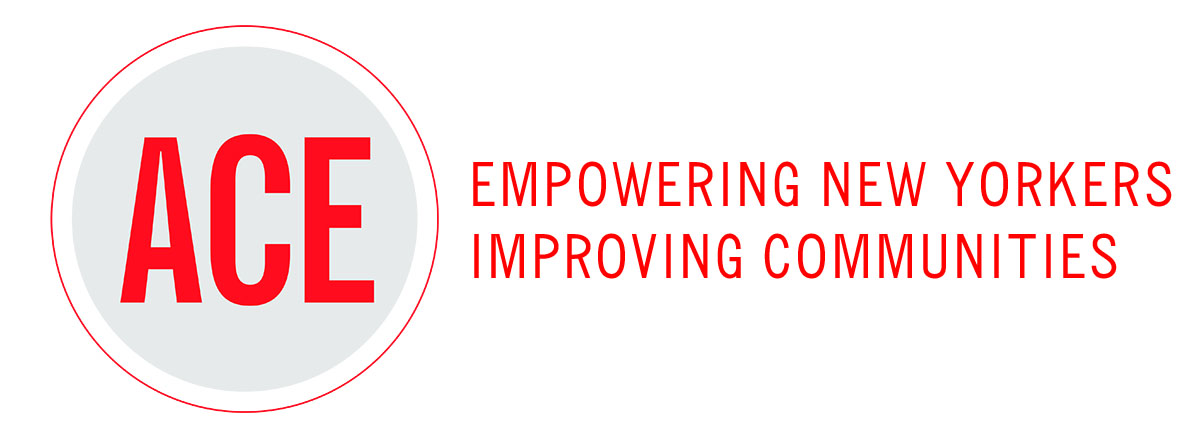A Message from ACE’s Executive Director
Dear Friends,
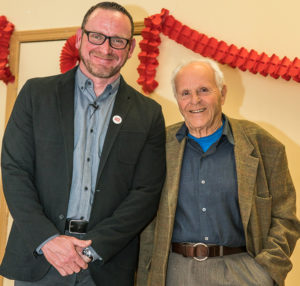
In the summer of 1992, as Henry Buhl walked from his home in SoHo, a homeless man asked him for $20. Rather than giving him the money, Henry offered him a job sweeping the sidewalk. Since that day, your generous support has helped ACE emerge as a leading provider of workforce development services for New York’s homeless men and women.
In 2017, ACE marked 25 years of service. We are proud of our accomplishments and appreciate your support.
Together, we have helped over 3,000 men and women secure full-time employment, changing the lives of thousands of New Yorkers and their families while improving the quality of life for millions city wide through our community improvement programs. We could not have done it without you!
In June of 2017, ACE moved from our long time home in SoHo to our new state of the art workforce development facility in Long Island City. With greater capacity, double the classroom space and increased computer terminal access, the move to the new facility best positions us to serve more of the estimated 60,000 New Yorkers who are currently experiencing homelessness.
As we begin a new chapter in our new home, 2018 brings new challenges. New York City is facing record numbers of men and women living on the street and in homeless shelters. We sincerely hope you will continue to support our programs and join us in our fight to end homelessness. Together, we can provide New Yorkers experiencing homelessness with hope for a better life.
Sincerely,

James Martin
Executive Director
John’s Story – My Addiction Took Everything From Me
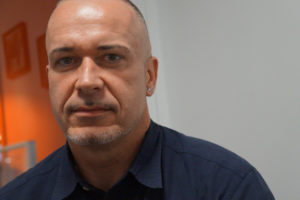
John grew up in Brooklyn in a middle class home, the youngest of 8 kids. He had a strong family support system and they helped him follow a positive track. John graduated high school, earned his bachelor’s degree, and spent his early adult life as a working professional.
“I worked as a doorman in a really nice building,” he remembers. “The people living there were prominent doctors and lawyers. I walked their dogs and watered their plants. They trusted me.” Things were going well for John, he had a nice apartment, his own car, and strong relationships with his family.
“At the beginning, I didn’t know what I was getting involved in. But once I used a needle, forget it, it was all I cared about.”
In his late twenties, John started spending time with people who were using cocaine recreationally. That was the beginning of a new chapter in his life. He became comfortable with drugs, and by his thirties, John was using heroin. “At the beginning,” he says, “I didn’t know what I was getting involved in. But once I used a needle, forget it, it was all I cared about.”
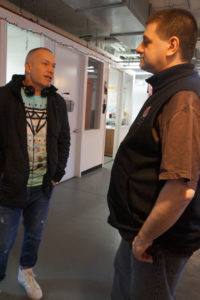
John spent the next decade in a cycle of addiction. At times he was homeless, and at times he had a place to stay. Even when he had somewhere to stay, however, he often still spent his nights in the streets, following his addiction.
After years of getting by, the next turning point came in 2016 when John was arrested. “I was buying heroin on Broadway and Houston,” he remembers. “A van pulled up and a bunch of police with guns jumped out. I always thought that I would be the guy to get away with things. I ended up getting sent to Rikers for almost a year.”
“My family would visit and have to wait hours. The corrections officers strip-searched them. It’s not something you want to put your loved ones through.”
At Rikers, John sank into a deep depression. He was forced to confront the pain he was putting his family through. “I lost my will to live,” he recalls. “My family would visit and have to wait hours. The corrections officers strip-searched them. There are dogs that had to sniff them to make sure there was no contraband. It’s not something you want to put your loved ones through.”
John vowed then to change his life. After nearly a year at Rikers Island, he was released into an inpatient treatment program, and from there he was referred to ACE—where he would prepare to rejoin the workforce and start living independently.
John got started in ACE’s classes and industry-specific trainings, gained work experience cleaning neighborhoods in the city, and built relationships with the staff. As his confidence grew, he started focusing on finding job leads and submitting resumes.
“At first they kept their distance, but I’ve regained their trust. I’m an uncle to my nieces and nephews. Family is the most important thing to me.”
“ACE showed me what I should be putting on my resume and where to look for jobs,” he recalls. “I sent out a few hundred resumes. Getting replies from so many companies really brought my self-esteem back. I felt like I was worth something again.”
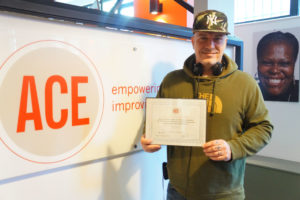
In October 2017, after two and a half months at ACE, John landed a job as a doorman at a performing arts school in Manhattan. It was his first full-time job in five years. “When they offered me the position it was unbelievable. I was ecstatic. All the time and effort meant something. I have benefits now. This is a career.”
John has established himself in his employment and sobriety, but most precious to him are the relationships he has won back with his family. “At first they kept their distance,” he says, “but I’ve regained their trust. I can be an uncle to my nieces and nephews now. Family is the most important thing to me.”
There are hundreds of men and women who, like John, are turning their lives around at ACE, and they rely on the generous support of community partners like you. Please consider making a gift today to empower New Yorkers with the skills they need to achieve their goals of employment, economic self-sufficiency, and family reunification.
47 New Yorkers Experiencing Homelessness Secure Full-Time Employment
On Thursday, February 22nd, over 150 supporters gathered for ACE’s Graduation Ceremony at the ACE Center for Workforce Development to honor the incredible men and women who have overcome homelessness and secured full-time employment. After months of classes, industry-specific trainings, and in-the-field work-experience, ACE’s 47 most recent graduates are now employed in full-time positions. At Graduation, these individuals inspired us by sharing some of the hardships and triumphs they faced in their personal journey and offered guidance to ACE’s current participants, who are preparing to become employed.
The graduates have now moved on from ACE’s training and placement program, Project Comeback, and are active in our employment after-care program, Project Stay. In Project Stay, we help our participants retain employment and increase their earning capacity.
We commend each graduate for all that they’ve accomplished and thank each ACE supporter for the contribution they have made to every success.
Video courtesy of ABC 7 Eyewitness News
Upcoming events – 2018 ACE Reflections of New York Gala

 You make life changing success stories possible. Make a tax-deductible gift today and put a New Yorker on the path to self-sufficiency.
You make life changing success stories possible. Make a tax-deductible gift today and put a New Yorker on the path to self-sufficiency.

